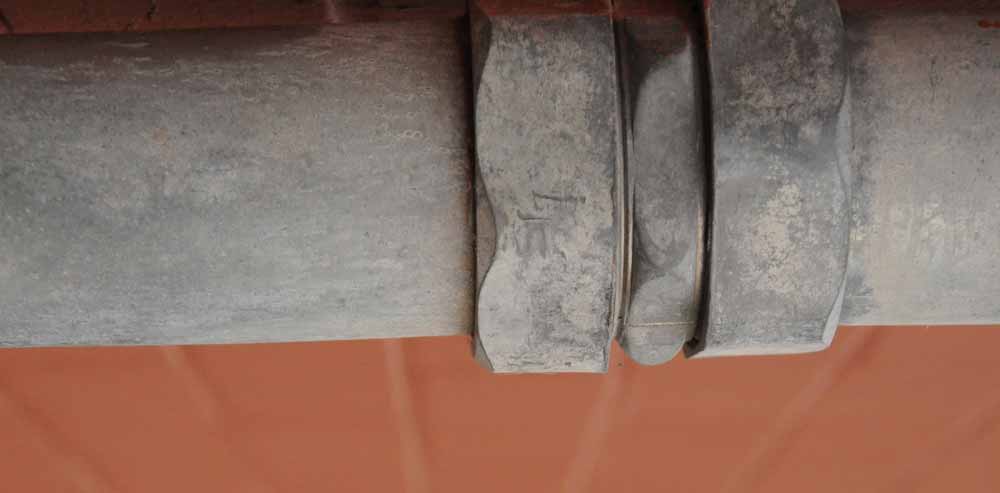Identifying Lead Pipes

Before more modern practices came into play in the 1970s, many houses were constructed using lead pipes for their plumbing. While this method served countless homes across the decades in terms of structural integrity and plumbing efficiency, lead pipes have since been surpassed by other materials, and their presence in homes has presented a cause for concern.
The concern lies with the lead molecules of the pipes over time disintegrating into the water that flows through it. This lead will inevitably find its way into our cups and glasses, mixing with our drinking water. Although it will only be trace amounts of the substance, enough of it can cause illness, some of which can be severe. Lead poisoning is only really a risk if you consume the lead, so baths and showers are unlikely to cause issues.
Have I got lead pipes?
In order to remove the risk of lead in your home’s water, you first need to identify lead pipes themselves. The best way to do this is to check the point where the water supply enters your property – this is usually under the stop cock under the kitchen sink, but sometimes it can be in a cupboard under the stairs, if you have one.
Lead pipes often have a dull grey hue, and if you scrape them with a sharp object, you’ll see a shiny metal underneath. If it isn’t a shiny metal you see, your pipes are likely composed of different materials.
If you are still concerned or cannot determine whether you have lead pipes, please contact your water, plumbing or drainage company, and they will be able to conduct a lead test to confirm outright.
If I do have lead pipes, what can I do?
If you identify lead pipes, then the best course of action is to get your pipes replaced. You should do this sooner rather than later – not only due to the old nature of the pipes becoming less effective over time, but also because of the important health risks.
A drainage company will be able to fit new, modern pipes that don’t pose any contamination risks. For any pipes that run outside the boundary of your property, you can liaise with your local water authority to have them replaced. There are a variety of ways to replace old pipes, including the less intrusive no-dig technology or fully fledged drain excavations.
What else can I do?
In the meantime, there are a couple of things you can do, but it is worth noting that these should only be considered a short term alternative.
- Try and use the cold water tap when drinking and cooking – hot water dissolves more lead than cold does. If you have young children, avoid using hot water for formulas.
- Run the tap for a few minutes before you use your water supply. Make sure the temperature has noticeably dropped before drinking, cooking or brushing your teeth. This is particularly important in the mornings, as water will have been standing in pipes overnight.
Please note: boiling water will not remove the lead from your water supply.
Symptoms of lead poisoning
It can take months, sometimes years for the effects of lead poisoning to accumulate and show in a person, but you don’t need to have large amounts of lead in your system to fall victim to lead poisoning. There are a number of symptoms to look out for if you feel you or someone you know may be at risk:
Symptoms in children
- Developmental delay
- Sluggishness and fatigue
- Abdominal pain
- Vomiting
- Irritability
- Learning difficulties
- Hearing loss
- Weight loss
- Seizures
- Eating things that aren’t food, such as chipped paint
Symptoms in adults
- High blood pressure
- Joint and muscle pain
- Memory or concentration difficulties
- Headache
- Mood disorders
- Abdominal pain
Symptoms of lead poisoning don’t usually show until you have dangerous amounts of lead in your system – this doesn’t have to be a large amount in itself, but still enough to affect the body. It can sometimes be difficult to detect – even seemingly healthy people can have a high lead content in their system. Children are primarily at risk of lead poisoning, but it’s also dangerous for adults.
—
If you think you have lead pipes in your property, getting them replaced is the recommended solution. Contact your local drainage experts who’ll be able to carry out the necessary inspections, tests and replacements where necessary.
Express Drainage Surveys are proud to provide comprehensive drain inspections & remedial works for commercial and residential customers throughout London. If you’d like to know more about what we do, please feel free to get in touch with us today – we’re happy to help.
